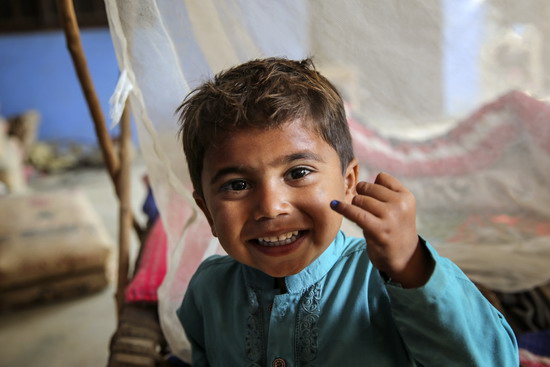The RCC is responsible for independently verifying polio eradication for all countries of the Region. Attendees from multiple partners involved in polio eradication efforts were present at the April meeting, including National Certification Committee representatives, RCC members, and delegates from Global Polio Eradication Initiative partners, including the World Health Organization, the US Centers for Disease Control and Prevention, and Rotary International. Dr Mohamed Al Hosni, the Undersecretary of the Ministry of Health in Oman, attended the inaugural session, underlining the commitment to polio eradication offered by Oman.
The meeting was opened with a brief talk from Dr Yacoub Al Mazrou, the Chairman of the RCC, followed by a message from Dr Ahmed Al Mandhari, the WHO Regional Director for the Eastern Mediterranean. In his address, Dr Al Mandhari highlighted successes and remaining gaps.
Dedicated health workers across the Region continue to make concerted efforts to ensure that every child is vaccinated against polio. In particular, the commission noted the outstanding work of health workers in Syria, whose efforts to raise immunity through vaccination helped to officially close the 2017 vaccine-derived poliovirus outbreak.
The Commission also noted that no evidence of wild polio virus type 3 (WPV3) had been detected in the Eastern Mediterranean Region from any source since 2012. This is despite the poliovirus surveillance network analysing over 300 000 stool and environmental samples across all Member States. Delegates at the Regional Certification Commission concluded that there is enough evidence, based on the large number of samples tested in most parts of the Region, that no WPV3 transmission has been missed, and the Region may be certified WPV3 free by the Global Certification Commission. Ridding the Region of this type of polio is an outstanding achievement, which underlines the incredible progress made towards keeping every child safe from polio paralysis.
Focusing on current challenges, the Commission underlined the urgent need to stop wild poliovirus type 1 transmission in Afghanistan and Pakistan. These 2 countries are the only remaining polio-endemic countries in the Region. Overcoming programmatic difficulties to search out the last pockets of the virus is a main regional priority for the coming months. The Regional Certification Commission commended achievements so far and urged both states to revisit their plans and identify any missing gaps to defeat the virus. The Commission also expressed their concern over continued cVDPV2 and 3 transmission in Somalia. New virus emergence remains a key risk in pockets of unreached children.
Until all traces of the poliovirus are eradicated and the poliovirus is contained, virus-free countries are at risk of virus importation. Considering this, the Commission encouraged Member States to engage in Polio Outbreak Simulation Exercises (POSE) to review and update their national plans and be ready to react to any importation.
Looking ahead, the Commission underlined the need for countries to prepare for post-certification, when the world will be considered officially polio-free. In particular, the RCC expressed its satisfaction with the implementation of the GAP III Phase 1 plan for the containment of polioviruses and urged remaining countries to expedite submission of the final phase 1 completion report.
Overall, the meeting underlined the spirit of collective determination and mutual understanding that has brought the Eastern Mediterranean Region to the brink of ending polio. In his remarks, the RCC Chair Dr Yagob Al Mazrou said, “I hope in near future we will meet for marking the success of polio eradication in the whole Region.”
With continued political and financial commitment, the region is in a strong position to close outbreaks and eradicate the poliovirus in its last few hiding places.
 Delegates gather to discuss progress and remaining challenges at the Thirty-third Eastern Mediterranean Regional Certification Commission for Poliomyelitis Eradication
Delegates gather to discuss progress and remaining challenges at the Thirty-third Eastern Mediterranean Regional Certification Commission for Poliomyelitis Eradication
A full record of past meetings of the Eastern Mediterranean Regional Certification Commission for Poliomyelitis Eradication can be found here. The thirty-fourth meeting of the commission will be held in 2020.









